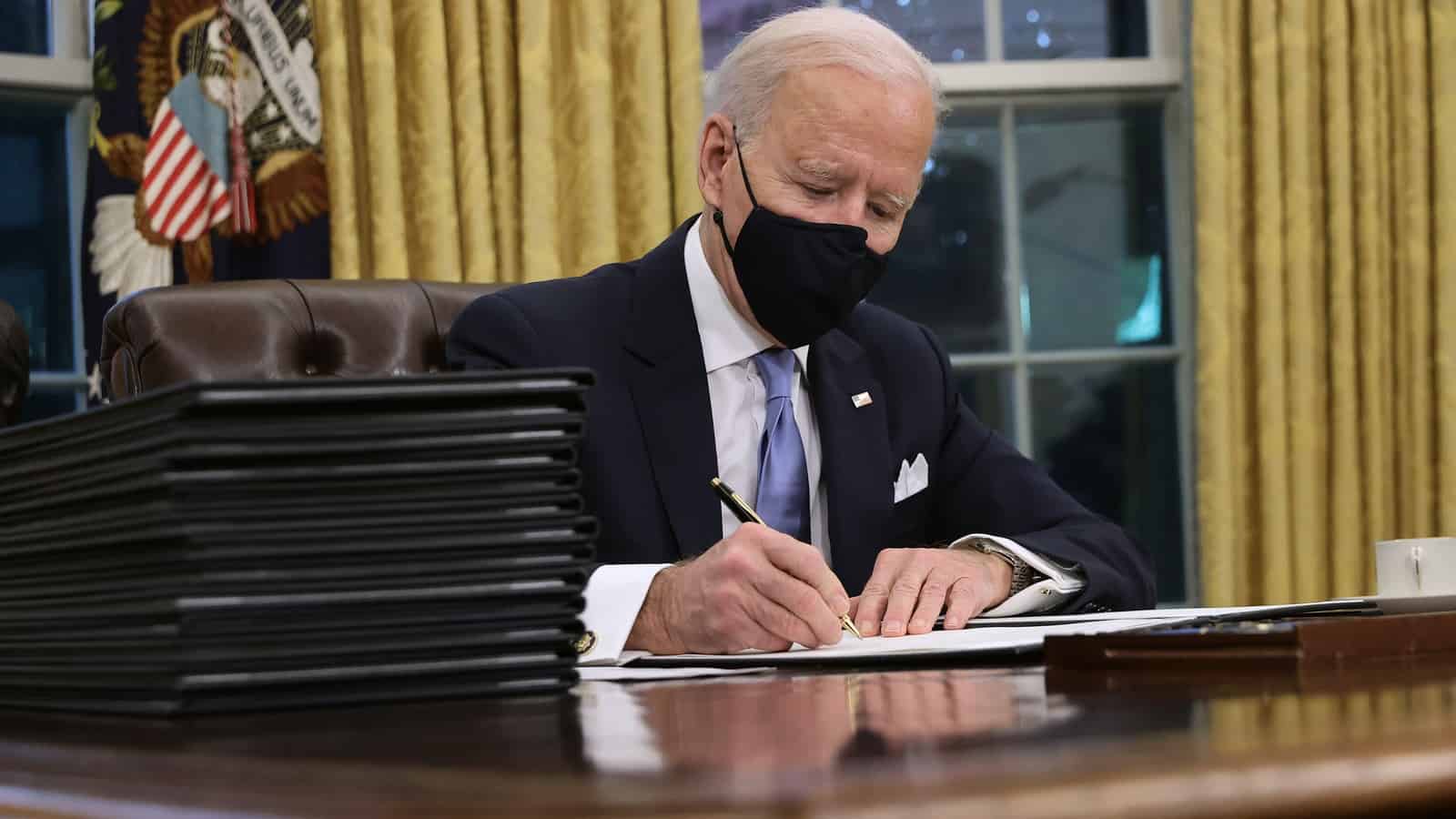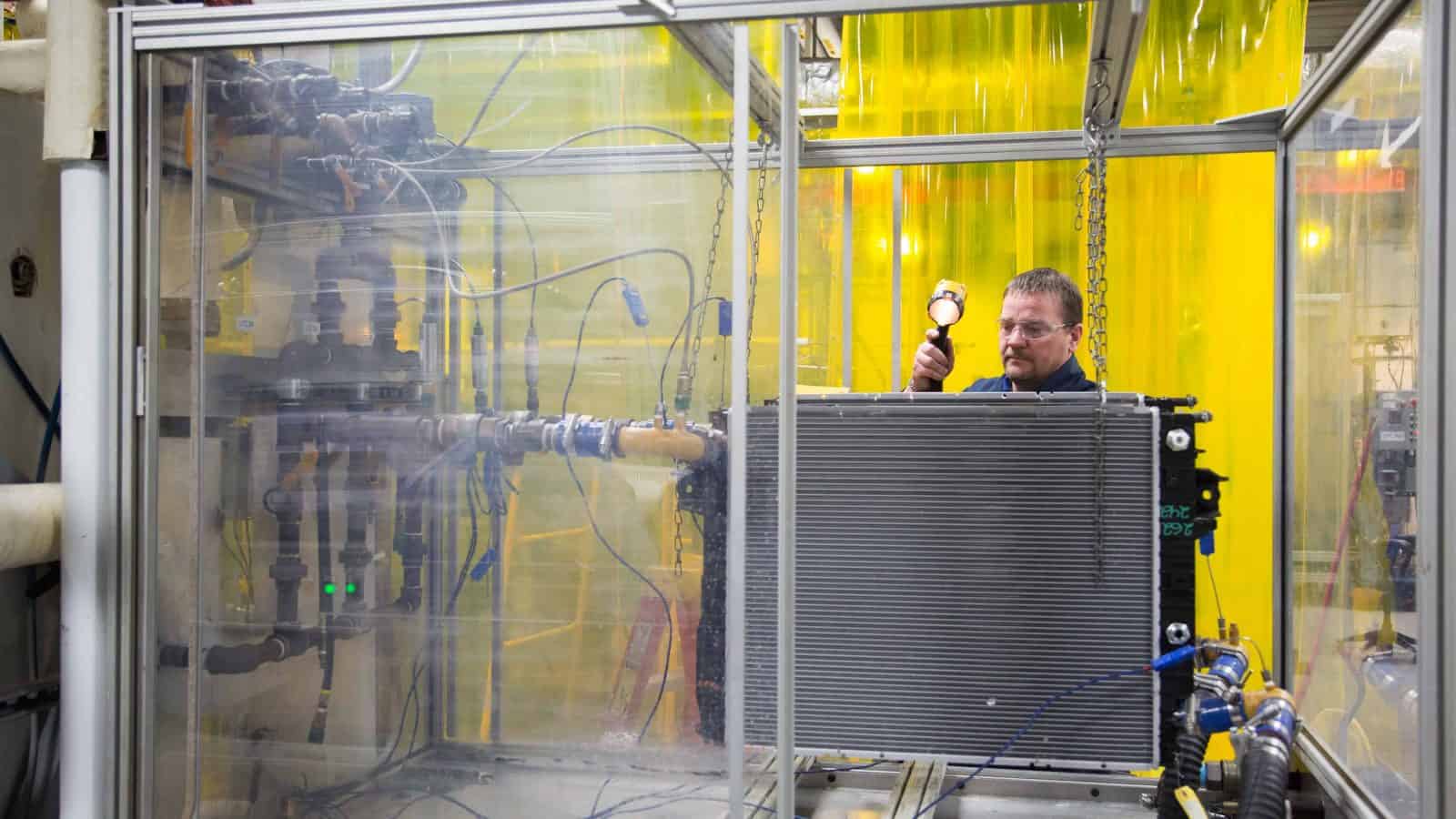New NEPA Rule Misses Larger Point
We Need to Be Focused on a Clear Permitting Strategy
Washington, D.C. – Following today’s National Environmental Policy Act permitting announcement, National Association of Manufacturers President and CEO Jay Timmons released the following statement:
“During this time of alarming global turmoil, we must do everything in our power to protect our energy security and increase domestic manufacturing—not only to maintain economic growth and deliver relief to American families but also to ensure we can continue leading the world in supporting the people of Ukraine. Today’s NEPA permitting announcement misses the larger point that we need to be pursuing a clear strategy to harness every possible source of energy here in the United States. Even though the administration kept many of the reforms the NAM had fought for, this does not provide the predictability and streamlined permitting we need. And if the next step in this process is derailed by unrealistic agendas, then America will feel the pain of a weaker economy, diminished national security and slower implementation of the Bipartisan Infrastructure Law.”
-NAM-
The National Association of Manufacturers is the largest manufacturing association in the United States, representing small and large manufacturers in every industrial sector and in all 50 states. Manufacturing employs more than 12.6 million men and women, contributes $2.71 trillion to the U.S. economy annually and accounts for 58% of private-sector research and development. The NAM is the powerful voice of the manufacturing community and the leading advocate for a policy agenda that helps manufacturers compete in the global economy and create jobs across the United States. For more information about the NAM or to follow us on Twitter and Facebook, please visit www.nam.org.
An ExxonMobil Engineer Makes a Difference

Erika Anderson didn’t always know she wanted to be an engineer. In fact, for most of her childhood, it wasn’t a career path she had even heard about.
- “I didn’t know what engineering was until my senior year in high school,” said Anderson. “I thought an engineer was a train driver, and nobody told me differently.”
A moment of truth: During her senior year, Anderson was told to research the major she wanted to explore after high school. She searched online, looking for careers for people who liked math and science—and the first thing that came up was engineering.
wanted to explore after high school. She searched online, looking for careers for people who liked math and science—and the first thing that came up was engineering.
- “It was all about people who like a challenge; people who are lifelong learners,” said Anderson. “And as I kept reading, I kept hearing myself in this description. People had always said, you’re smart, you should be a doctor or a lawyer. But nobody ever said engineer.”
Her journey: At Spelman College and the Georgia Institute of Technology, Anderson studied mathematics and mechanical engineering, respectively, while working for GE Aviation and NASA. But it was during a semester spent working at ExxonMobil that she found her passion.
- “ExxonMobil was challenging, and I absolutely loved it,” said Anderson. “I loved the boots, the hard hats, getting my hands dirty. I was able to go out into the field, see all the equipment. I was in awe. I fell in love with it.”
Her job: On her last day in the office during her program at ExxonMobil, the company offered Anderson a full-time job. Today, she’s in her eighth year, working as both the reliability engineer and the reliability coordinator in Baytown, Texas. For ExxonMobil, those are critical roles, tasked with ensuring that the company’s equipment keeps functioning as designed. The way Anderson explains it:
- “Your car comes with a manual and it tells you when you’re supposed to change your oil or rotate your tires. And someone has to figure out how long that oil or those tires can run. I’m not dealing with cars, but I’m dealing with heat exchangers, compressors and pumps. I ensure that this equipment works, that it works reliably, and that we’re making repairs at an interval that keeps your equipment working as it should.”
Making a difference: As a Black woman in manufacturing, Anderson is used to being different from the people around her. She has found herself confronting stereotypes and preconceived notions about who she is. It hasn’t always been easy, but she’s doing vital work—and ensuring that other young women have the opportunity to follow their passions.
An example to others: Anderson was recently recognized by The Manufacturing Institute, the workforce development and education partner of the NAM, as a 2021 STEP Award Emerging Leader. The award is presented to women leaders in science, technology, engineering and production careers who exemplify leadership within their companies and in manufacturing in general.
- She’s also been featured in a book called Everyday Superheroes: Women in Energy about women in different fields in the energy industry; a TV show on CBS highlighting women in STEM; and a project by The Smithsonian and IF/THEN to put up 120 3D-printed statues of women trailblazers in Washington, D.C.
Advice for others: Anderson is an advocate for other women who are considering a career in manufacturing. She encourages women to find mentors, build a network and, above all, be confident.
- “Self-doubt is real, and sometimes, we can be our own biggest critics,” said Anderson. “We have to understand that we are excellent. We are great. And at the end of the day, for any woman coming to this industry—if you’re even thinking about it—there’s something in you. If it were easy, everyone would be doing it.”
The last word: “My grandmother always told me: you’ve got to get comfortable with being uncomfortable. The only way things will change is by having more people like me in the room. We are just as capable as anyone else, and whatever preconceived notions that may exist, I am here to kick those doors down.”
Manufacturers: America Deserves Long-Term Energy Security
Washington, D.C. – Following President Joe Biden’s order to release 1 million barrels of oil per day from the Strategic Petroleum Reserve and to secure American production of critical materials, National Association of Manufacturers President and CEO Jay Timmons released the following statement:
“Manufacturers are encouraged to see President Biden’s continued focus on taming inflation and addressing the energy concerns stoked by Vladimir Putin’s war on Ukraine and supply chain disruptions around the world.
“Manufacturers strongly support President Biden’s actions to secure American production of critical minerals and materials. This has the potential to be a game-changer, not only for developing clean energy but also for other uses that will help to address the supply chain challenges precipitated by the COVID-19 pandemic and further compounded by the war in Ukraine. Yesterday, I also met with Commerce Secretary Raimondo, Australian Trade Minister Tehan and leading manufacturers to discuss strategies for supporting critical mineral supply chains. Manufacturers know there is not a quick solution, and we need more of this type of bold, collaborative, long-term leadership to strengthen our energy security.
“The release from the Strategic Petroleum Reserve may provide relief at a time when manufacturers and American families are all coping with higher energy prices, but this is only a very temporary fix. It doesn’t deliver the long-term energy security that America deserves—the confidence that comes from producing more energy from all sources here in the United States.
“Manufacturers are pleased to hear the President call for increasing domestic oil and gas production and are counting on him to follow through on his support. However, the ‘use it or lose it’ provision may sound catchy and even be well-intentioned, but it fundamentally misunderstands the way that energy exploration, extraction and production works in reality. It would instead undermine our ability to produce American energy.
“We remain committed to working with the administration and leaders in both parties to help lead America through these ongoing crises—and deliver for the American people.”
-NAM-
The National Association of Manufacturers is the largest manufacturing association in the United States, representing small and large manufacturers in every industrial sector and in all 50 states. Manufacturing employs more than 12.5 million men and women, contributes $2.57 trillion to the U.S. economy annually and has the largest economic multiplier of any major sector and accounts for 58% of private-sector research and development. The NAM is the powerful voice of the manufacturing community and the leading advocate for a policy agenda that helps manufacturers compete in the global economy and create jobs across the United States. For more information about the NAM or to follow us on Twitter and Facebook, please visit www.nam.org.
Manufacturers Reject Political Ploy Geared Toward U.S. Energy Companies
Geared Toward U.S. Energy Companies Timmons: Policymakers should be singularly focused on saving the people of Ukraine
Washington, D.C. – Following Sen. Elizabeth Warren’s (D-MA) calls for a new tax targeting America’s energy companies shortly after the new sanctions on Russian energy imports, National Association of Manufacturers President and CEO Jay Timmons released the following statement:
“Our country is sacrificing to save the Ukrainian people, and this is a blatant political ploy to exploit a crisis to enact an extremist agenda. American policymakers should be singularly focused on saving the people of Ukraine and ending a dictator’s expansionist ambitions, instead of attacking American businesses that are doing all we can to support our government’s efforts to bring about peace.”
-NAM-
The National Association of Manufacturers is the largest manufacturing association in the United States, representing small and large manufacturers in every industrial sector and in all 50 states. Manufacturing employs more than 12.5 million men and women, contributes $2.57 trillion to the U.S. economy annually and has the largest economic multiplier of any major sector and accounts for 58% of private-sector research and development. The NAM is the powerful voice of the manufacturing community and the leading advocate for a policy agenda that helps manufacturers compete in the global economy and create jobs across the United States. For more information about the NAM or to follow us on Twitter and Facebook, please visit www.nam.org.
Manufacturers on Petroleum Release: “Today’s Action Is, Unfortunately, Just a Band-Aid”
Washington, D.C. — Following President Joe Biden’s decision to release 50 million barrels from the Strategic Petroleum Reserves, National Association of Manufacturers President and CEO Jay Timmons released the following statement:
“Today’s action is, unfortunately, just a band-aid. Tapping the Strategic Petroleum Reserve won’t solve the underlying problems. While we are pleased that President Biden is focusing on the rising cost of fuel, this is not a sustainable solution.
“A true energy strategy would strengthen our energy independence, enhance manufacturers’ competitiveness and alleviate many of the other supply chain challenges facing our nation. Instead of asking OPEC and Russia to fill the void, we should let American energy workers take the lead, setting an example with America’s high standards for protecting workers and the environment. Manufacturers call on the Biden administration to work toward real, longer-term solutions for the good of our families, industry and economy.”
-NAM-
The National Association of Manufacturers is the largest manufacturing association in the United States, representing small and large manufacturers in every industrial sector and in all 50 states. Manufacturing employs more than 12.5 million men and women, contributes $2.5 trillion to the U.S. economy annually and has the largest economic multiplier of any major sector and accounts for 58% of private-sector research and development. The NAM is the powerful voice of the manufacturing community and the leading advocate for a policy agenda that helps manufacturers compete in the global economy and create jobs across the United States. For more information about the NAM or to follow us on Twitter and Facebook, please visit www.nam.org.
The NAM Goes to the Supreme Court

Spring is the season of SCOTUS, when the court releases its most important decisions for the year. This year, the NAM is awaiting decisions on a number of cases in which it participated as an amicus—a “friend of the court”—and has already received one significant victory: a ruling in favor of energy companies on a procedural issue regarding climate lawsuits.
We spoke to two of the NAM’s legal experts—Vice President of Legal and Deputy General Counsel Patrick Hedren and Senior Litigation Counsel Erica Klenicki—to get the overview of this busy season for the NAM’s Manufacturers’ Center for Legal Action.
Energy victory: The court ruled in favor of the energy companies in a suit brought against them by the city of Baltimore. As Hedren puts it, the case hinged on a “wonky procedural issue,” but the crux was this: where should nationwide issues be litigated, particularly if the federal government played some role?
- The energy companies and the NAM argued that climate change is just such a nationwide and even global issue and simply cannot be decided by state courts. The nature of the issue makes access to federal courts paramount.
- SCOTUS’s ruling didn’t address the underlying climate concerns, but it did provide easier access to federal courts for these types of disputes, say Hedren and Klenicki.
Class actions: The NAM is awaiting the Supreme Court’s decisions on several other cases in which it participated, including TransUnion LLC v. Ramirez, which deals with a key issue for large manufacturers and other companies: class-action lawsuits.
- As the NAM’s legal team notes, these cases are often brought by attorneys looking for a payday, even when the vast majority of the “class” in question, though technically affected, was not really injured.
- That’s what happened in this case. The class included people whom TransUnion mistakenly identified as potential matches for individuals on the Treasury Department’s terror watch list, which could have resulted in denials of loans.
- Though the lead plaintiff did allegedly suffer harm due to this error, most of the 8,000-plaintiff class were entirely unaware of the error. The company had fixed its mistake before those plaintiffs were harmed.
To put it simply, the rules for class actions are far from clear, say Hedren and Klenicki. The courts often award damages or settlement money to uninjured people who could not have brought a case on their own. And the only winner in this system is the plaintiffs’ bar. That’s why the NAM is asking SCOTUS to clarify the rules for bringing a class action and ensure that trial courts are applying rigorous standards before certifying a class.
Free speech: The NAM is also awaiting the court’s decision on Americans for Prosperity Foundation v. Becerra, a case concerning whether the government can force an organization to disclose the identities of its donors. While the NAM doesn’t have donors, it does have a keen interest in keeping its member list confidential. If all such lists had to be released, it would “chill free speech,” say Hedren and Klenicki.
Following suit(s): Lastly, the NAM team is asking the court to hear several other cases during its next term, including:
- Miller v. CH Robinson Worldwide, Inc. In this case, the plaintiff was injured by a truck belonging to a small company, yet was allowed to sue the freight broker that hired the trucking company, too—despite a federal law that preempts those kinds of suits. The NAM is asking SCOTUS to consider the case so it can put commonsense limitations on liability.
- City of Oakland, et al. v. Chevron Corp., et al.: This case is very similar to the energy case mentioned above.
The last word: Hedren explains why the NAM’s involvement in our nation’s highest court is so important: “The Supreme Court really values the manufacturing sector’s perspective, in part because bad decisions in a single lower court can have ripple effects across the whole economy. The NAM pays close attention to those cases that might really change—for better or worse—the way the sector operates, or that might open the door for crafty lawyers to abuse the court system. If we’re not out there fighting for better legal policy, we’ll face a legal system increasingly tilted in favor of game-playing and abuse.”
It’s Time to Take Methane Seriously

Methane, a more powerful greenhouse gas than CO2, is back in the news again, as the Biden administration takes steps to regulate it. As it happens, reducing harmful pollutants like methane is a key priority of the NAM’s work on climate action. We spoke with NAM Vice President of Energy and Resources Policy Rachel Jones recently about the NAM’s advocacy on the issue.
The background: Recently, the EPA announced that it would craft regulations on methane, a shift from the previous administration’s refusal to directly regulate it, Reuters reports. The agency will unveil new regulations later this year.
Meanwhile, the Senate passed a resolution that “effectively reinstates” the Obama administration’s standards, according to The New York Times (subscription). The House is expected to consider the resolution soon.
The NAM’s position: “Getting the U.S. methane strategy right is critical for climate action and will set the bar for the rest of the world,” says Jones. “As the EPA moves to write new methane regulations, manufacturers are working with the agency to share our expertise. We support technology-based standards that reward early and aggressive action, while providing the flexibility to promote innovation and ensure we get the most reductions at the lowest cost. That would be a real win–win.”
- “The balancing act is important here because manufacturers rely on natural gas,” Jones adds. “The richness of this resource has redefined America’s competitive advantages within the global economy, especially within the manufacturing sector. We can’t afford to lose that if we fail to get regulations right.”
The energy mix: “A lot of people also don’t realize how natural gas supports the increasing role renewables are playing, because the sun and wind are intermittent sources of energy,” Jones says. “Natural gas can be ramped up or down quickly, making it the best option for balancing the intermittent nature of many renewables.”
Energy security: Jones adds that methane regulations are essential to long-term U.S. energy security for two reasons: they will help ensure electricity stability by supporting the combination of natural gas and renewables described above, and they will strengthen America’s position as a robust exporter of LNG.
- “Achieving gold standard status for methane management is now the price of admission to global LNG trade,” Jones explains. “If producers in the U.S. can show they are managing methane responsibly, they will find even more eager buyers.”
The last word: NAM President and CEO Jay Timmons said, “Climate change is an issue our generation must tackle. Like past generational challenges—world wars, the space race, the COVID-19 response and vaccine development—manufacturers will lead the way and ensure our country emerges stronger. When have Americans ever been timid in the face of difficulty? We look forward to learning more specific details of the administration’s methane strategy, and manufacturers are ready to work with policymakers on both sides of the aisle to achieve success for our nation and world.”
Read more about the NAM’s climate policy recommendations in The Promise Ahead.
NAM Helps Avert Compliance Crisis

Manufacturers across many sectors were surprised in recent weeks by a ban on products containing a chemical called PIP (3:1), which was slated to go into effect after March 8, 2021. Due to the incredibly short compliance window and because PIP has not been regulated elsewhere in the world, it is a major challenge even to identify its potential presence in supply chains.
The sudden ban could have caused significant disruption in the manufacturing industry and snarled the economic recovery, NAM Vice President of Energy and Resources Policy Rachel Jones tells us. Here’s what you need to know.
Why it matters: While there is no PIP chemical manufacturing in the United States, it can be found in a broad array of components that are used in electronics; robotics and manufacturing equipment; gaskets, clamps, tubes, harnesses, cables and casings; and in many other applications for flame retardant purposes. The ban would have a serious impact on manufacturers in the United States, forcing them to scrutinize every component of their supply chains for PIP, rework manufacturing processes and find new materials in an impossibly short timeframe.
The COVID-19 angle: Many of the products that would be impacted by this rule are being used to conduct research into COVID-19, whether that involves an examination of COVID-19 variants or developing, producing, storing and distributing COVID-19 vaccines. If this rule goes forward without being fixed, some of these products could become unavailable at a time when they are needed most.
What we did: The consensus from some experts was that changing the Biden EPA’s approach on this matter was a futile effort. But the NAM pressed forward and asked the EPA to issue a “no action assurance” for downstream manufacturers until the PIP rule can be amended to include a reasonable compliance timeframe. At the same time, the NAM moved forward in court to preserve relief options and to ensure that manufacturers affected by the rule can be made whole.
The results: After the NAM’s intervention, the EPA announced a 180-day “No Action Assurance” and opened a new 60-day comment docket to reexamine the rule. The NAM will continue to work with the EPA to find a reasonable approach that supports manufacturers and upholds critical standards.
The last word: Jones says, “When manufacturers are willing to speak up on challenging issues, we can solve complex problems. I have zero doubt that EPA’s extraordinary action was in response to our work with many NAM members and collaborative solutions-focused advocacy. While we celebrate this important interim victory, it is only a 180-day window of relief and manufacturers need more time.”
President Biden Gets to Work, and the NAM Responds

As President Joe Biden took office yesterday, the NAM took a pragmatic stance, calling this new political era “a time for healing.” As NAM President and CEO Jay Timmons put it, “Today, manufacturers recommit ourselves to be part of the solution—to be part of the healing process. We invite all Americans to join us in doing the same.”
And since the new president started his first day with a flurry of executive orders, the NAM responded to those, too. Here’s a rundown of the new policies, plus the NAM’s statements.
Immigration: While also moving to reverse a ban on immigration from certain Muslim-majority countries, President Biden strengthened the Deferred Action for Childhood Arrivals program, offering support to the so-called Dreamers. He called on Congress to pass comprehensive immigration reform that provides Dreamers with permanent status and a path to citizenship.
- Responding to the DACA action, Timmons said, “Manufacturers are very encouraged by today’s critical first step. . . . The broad goals of the Biden plan align with many of the core recommendations in ‘A Way Forward,’ manufacturers’ post-partisan roadmap for immigration reform. The path we have laid out is one that we believe can bring the country together, and we look forward to working with the Biden administration to move a comprehensive immigration reform plan through Congress.”
Keystone XL: President Biden also rescinded the permit for the Keystone XL pipeline, at least temporarily erecting a barrier to its progress.
- “Manufacturers are disappointed with the administration’s decision to block this sustainable project, which can serve as a model for infrastructure of the future, and if not reconsidered, represents a missed opportunity for manufacturing workers in America,” said Timmons. “Manufacturers have a strong commitment to responsible environmental stewardship, and protecting our environment does not require us to walk away from his job-creating opportunity.”
COVID-19: Ten executive orders focused on combating the COVID-19 pandemic, according to CNBC. The NAM had called for aggressive actions to support manufacturers’ COVID-19 response months ago, including in its April “American Renewal Action Plan” and, mostly recently, in conversations with the transition team.
- The orders included a new COVID-19 response office as well as a pandemic supply chain resilience strategy to help strengthen domestic production of important supplies.
- President Biden also restored U.S. membership in the World Health Organization and directed agencies to use the Defense Production Act to spur production of critical materials like N95 masks, swabs and other vaccine- and virus-related equipment.
“It’s very encouraging to see [President Biden] is starting off with strong, decisive action to fight COVID-19, save lives and get our economy on the road to recovery,” said Timmons on Twitter. “Manufacturers are committed to ending this deadly pandemic.”
Masks on: One of President Biden’s orders will now require masks to be worn on federal property, and he plans to require masks on public transportation as well. The NAM has prioritized face coverings since the beginning of the pandemic, including by launching a “Wear a Face Covering” ad campaign and providing a crucial estimate of how many masks American businesses need.
- “President Joe Biden is showing real leadership with his executive orders on masks,” said Timmons. “Masks save lives, help us keep our economy open and are vital until we can all get vaccinated.”
Timmons: Sustainable Keystone XL Project Is Model for Future Infrastructure
Walking Away Could Cost 10,000 Jobs
Washington, D.C. – Following President Joe Biden’s executive order to rescind the permit for the Keystone XL project, National Association of Manufacturers President and CEO Jay Timmons released the following statement:
“Manufacturers are disappointed with the administration’s decision to block this sustainable project, which can serve as a model for infrastructure of the future, and if not reconsidered, represents a missed opportunity for manufacturing workers in America. The Keystone XL project would employ 10,000 union workers for pipeline construction, spur additional renewable energy projects, operate with net-zero emissions and improve our energy security.
“This critical union project has evolved over the past five years, so we look forward to highlighting the importance of this modern project for manufacturers. Rebuilding our economy will require us to invest in infrastructure of all types, including Keystone XL. Manufacturers have a strong commitment to responsible environmental stewardship, and protecting our environment does not require us to walk away from this job-creating opportunity.”
Recently, the NAM and several labor unions wrote to President Biden on the impact of rescinding the permit for the Keystone XL project and the ways the project has evolved in recent years.
-NAM-
The National Association of Manufacturers is the largest manufacturing association in the United States, representing small and large manufacturers in every industrial sector and in all 50 states. Manufacturing employs more than 12.3 million men and women, contributes $2.32 trillion to the U.S. economy annually and has the largest economic multiplier of any major sector and accounts for 63% of private-sector research and development. The NAM is the powerful voice of the manufacturing community and the leading advocate for a policy agenda that helps manufacturers compete in the global economy and create jobs across the United States. For more information about the NAM or to follow us on Twitter and Facebook, please visit www.nam.org
